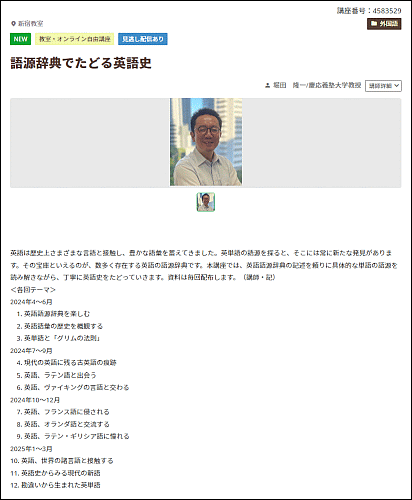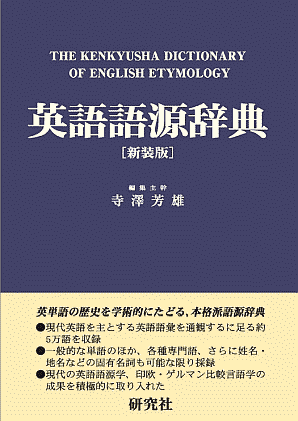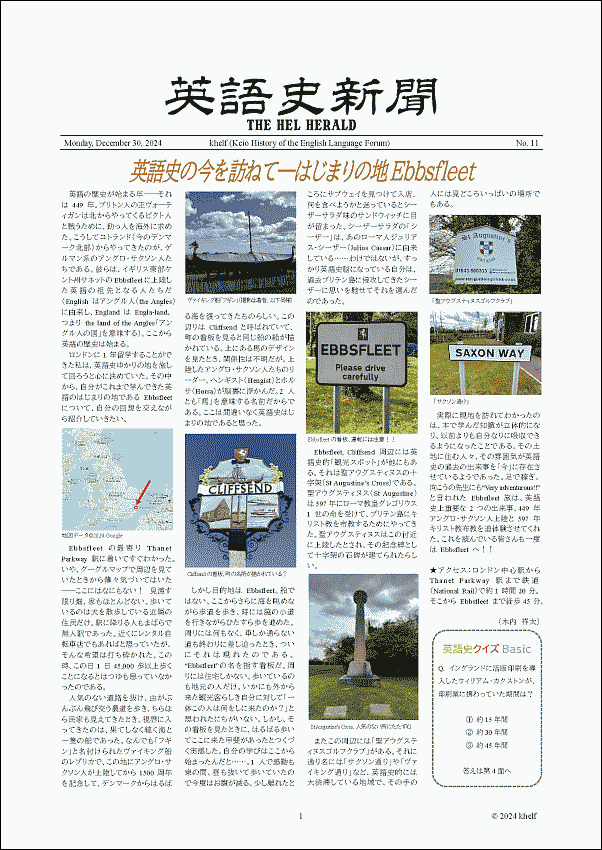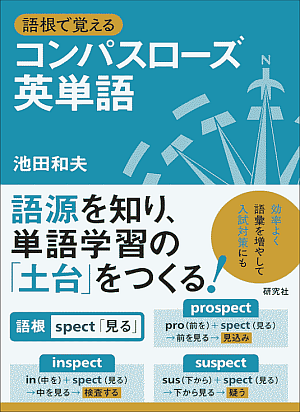2025-01-16 Thu
■ #5743. 1月25日(土)の朝カルのシリーズ講座第10回「英語,世界の諸言語と接触する」のご案内 [asacul][notice][kdee][etymology][hel_education][helkatsu][link][lexicology][vocabulary][contact][borrowing][loan_word][voicy][heldio][cosmopolitan_vocabulary]

・ 日時:1月25日(土) 17:30--19:00
・ 場所:朝日カルチャーセンター新宿教室
・ 形式:対面・オンラインのハイブリッド形式(1週間の見逃し配信あり)
・ お申し込み:朝日カルチャーセンターウェブサイトより
今年度の朝カルシリーズ講座「語源辞典でたどる英語史」が,月に一度のペースで順調に進んでいます.主に『英語語源辞典』(研究社)を参照しながら,英語語彙史をたどっていくシリーズです.
1月25日(土)の夕刻に開講される第10回は,冬クール(3回分)の始まりとして「英語,世界の諸言語と接触する」と題して,近代英語期における世界中の諸言語からの借用語にフォーカスします.
ヨーロッパの近代英語期は,大航海時代で幕が開きます.イギリスは,スペインやポルトガルなどの列強には遅れたものの,何とか世界展開の足かがりをつかみ,2世紀半ほどの時間をかけてイギリス帝国を作り上げます.七つの海を支配したイギリスは,この過程を通じて世界中の言語と接触することになり,世界的語彙 (cosmopolitan_vocabulary) という滋養が,英語という言語に大量に流れ込んでくることになりました.英語語彙は,語源を追いかけていくだけで世界一周できるほどの豊かさを得たのです.英語界最大の辞書である OED (= Oxford English Dictionary) の編纂企画が打ち上げられたのは,上記過程の機の熟したイギリス帝国の絶頂時代,19世紀後半のことでした.今回の講座では,英語語彙史上とりわけ激動の時代というべき,この近代英語期における言語接触に注目します
本シリーズ講座の各回は独立していますので,過去回への参加・不参加にかかわらず,今回からご参加いただくこともできます.過去9回分については,各々概要をマインドマップにまとめていますので,以下の記事をご覧ください.
・ 「#5625. 朝カルシリーズ講座の第1回「英語語源辞典を楽しむ」をマインドマップ化してみました」 ([2024-09-20-1])
・ 「#5629. 朝カルシリーズ講座の第2回「英語語彙の歴史を概観する」をマインドマップ化してみました」 ([2024-09-24-1])
・ 「#5631. 朝カルシリーズ講座の第3回「英単語と「グリムの法則」」をマインドマップ化してみました」 ([2024-09-26-1])
・ 「#5639. 朝カルシリーズ講座の第4回「現代の英語に残る古英語の痕跡」をマインドマップ化してみました」 ([2024-10-04-1])
・ 「#5646. 朝カルシリーズ講座の第5回「英語,ラテン語と出会う」をマインドマップ化してみました」 ([2024-10-11-1])
・ 「#5650. 朝カルシリーズ講座の第6回「英語,ヴァイキングの言語と交わる」をマインドマップ化してみました」 ([2024-10-15-1])
・ 「#5669. 朝カルシリーズ講座の第7回「英語,フランス語に侵される」をマインドマップ化してみました」 ([2024-11-03-1])
・ 「#5704. 朝カルシリーズ講座の第8回「英語,オランダ語と交流する」をマインドマップ化してみました」 ([2024-12-08-1])
・ 「#5723. 朝カルシリーズ講座の第9回「英語,ラテン・ギリシア語に憧れる」をマインドマップ化してみました」 ([2024-12-27-1])
本講座の詳細とお申し込みはこちらよりどうぞ.『英語語源辞典』(研究社)をお持ちの方は,ぜひ傍らに置きつつ受講いただければと存じます(関連資料を配付しますので,辞典がなくとも受講には問題ありません).

第10回については,Voicy heldio でも「#1325. 1月25日(土)の朝カル講座「英語,世界の諸言語と接触する」としてご案内していますので,ぜひお聴きください.
・ 寺澤 芳雄(編集主幹) 『英語語源辞典』新装版 研究社,2024年.
2025-01-06 Mon
■ #5733. 英語に関する素朴な疑問 千本ノック --- 年末ヴァージョン with 小河舜さん [senbonknock][sobokunagimon][voicy][heldio][hel_education]
昨年末の12月26日(木)の午後,小河舜さん(上智大学)とともに,大学生から寄せられていた質問を話題に,Voicy heldio の生配信で,何度目かになる「千本ノック」 (senbonknock) をお届けしました.そのアーカイヴ版を,一昨日配信しましたので,ご案内します.「#1315. 英語に関する素朴な疑問 千本ノック --- 年末ヴァージョン with 小河舜さん(生配信)です.55分ほどの回となっています.以下に,参考のため,寄せられた質問と本編チャプター内での対応する分秒を一覧します.今回回答したのは8問のみですが,各々の話題を2人で縦に横に広げてトークしましたので,全体として充実した回となっていると思います.じっくりとお聴きいただければ.
(1) 02:35 --- 英語語彙における借用語は,ヨーロッパ起源のものが中心で,アメリカやアフリカ起源のものはあるのでしょうか?
(2) 09:15 --- 「help 人 (to) do」の構文で to が付かなかったりするのは,言語の単純化によるものなのでしょうか?
(3) 13:05 --- 日本語では「和語」「漢語」「外来語」を瞬時に弁別でき,ニュアンスの傾向も分かりますが,英語の native words と loan loanwords には,このような傾向はあるのでしょうか?また,英語話者はそれらを瞬時に弁別できるのでしょうか?
(4) 20:25 --- 文法性が存在することのメリットは何なのでしょうか? 現代英語のように性がない方がスッキリしているように感じます.また,文法性はどのように決まったのでしょうか?
(5) 28:09 --- 動詞に付く3人称「単数」現在が -s で,名詞に付く「複数」も -s ということが,英語を学び始めたときに不思議だなと思いました.
(6) 33:10 --- yes/no question は文末上げ調子になるのに対し,wh-question は通常下げ調になるのはなぜでしょうか? 現在のイントネーションになったのはいつ頃でしょうか? ([追加の投げ込み質問として]question mark はいつ頃から使われるようになったのですか?)
(7) 44:07 --- アポストロフィーは短縮形だけでなく Mary's のように所有格でも使われます。また CD の複数形として CD's の形もあると聞いたことがあります.アポストロフィの使われ方の歴史を知りたいです.
(8) 48:59 --- 現代英語は地域的にも社会的にもバリエーションが豊富にありますが,特定の表現がどの地域でどのような方々に使われているのかを検索できるようなツールはありますか?
今年もいろいろな形で「千本ノック」をやっていきたいと思います.皆さんもぜひ投げ込み用に素朴な疑問を温めておいていただけますと幸いです.
2025-01-03 Fri
■ #5730. 『英語史新聞』第11号が発行されました [hel_herald][notice][khelf][hel_education][link][helkatsu]

昨年末の12月30日,khelf(慶應英語史フォーラム)が制作している『英語史新聞』シリーズの第11号がウェブ上で公開されました.こちらよりPDFで自由に閲覧・ダウンロードできます.年末のドタバタに紛れての公開となりましたが,今回も力を込めて制作していますので,新年にゆっくりとお読みいただければ幸いです.
2022年4月1日の創刊号発行以来,着実に号を重ねてきました.編集委員会,レイアウト担当,執筆陣もそれぞれスキルアップし,毎回良質の英語史関連の記事をお届けできるようになってきています.いつも khelf のhel活 (helkatsu) を応援してくださっている読者の皆さんのおかげです.感謝申し上げるとともに,本年もよろしくお願いいたします.
さて,今回の第11号の記事のラインナップは以下の通りです.執筆陣には,学部3年生から大学院博士課程の学生まで,khelf の多様なメンバーが集まりました.
・ 英語史の今を訪ねて --- はじまりの地 Ebbsfleet (第1面)
イギリス留学から帰国した大学院生メンバー(古英語専攻)による,英語史旅行記なる新ジャンルの記事.Ebbsfleet とはどこ? 何があるの? どうして英語史と関係があるの? ぜひ読者の皆さんも,アングロサクソン時代にタイムスリップしてみてください.
・ The Englishes of STAR WARS(第2面)
壮大なスケールの英語史・社会言語学の記事.『スター・ウォーズ』ファンは唸ること間違いなし.ファンでなくとも,映画だけでこんなにおもしろく言語学できるのか,と驚くはずです.学部3年生による記事で,力作です.
・ 英語史ラウンジ by khelf 「第4回 寺澤盾先生 中編」(第3面)
英語史研究者にインタビューするシリーズの第4弾の中編となります.前回に引き続き,khelf メンバーのインタビュアー3名が寺澤盾先生(青山学院大学教授,東京大学名誉教授)にお話しを伺っています.寺澤先生の Ph.D を取得後,どのようなご研究をされてきたか,どのような姿勢で研究に向き合ってきたか,また書籍の出版について,お話しくださっています.
・ 英語史クイズ Basic(第4面)
前号より始まった英語史の基本を楽しく学ぶ新企画の第2弾です.英語史の始まりとされる,イングランドに活版印刷術を導入したウィリアム・カクストンが,印刷業に携わっていた期間は? 答え合わせをしつつ,詳しい解説を読んでいただければ.
今号の発行日である年末の12月30日に,heldio 配信回を通じて khelf メンバーとともに広報しています.「#1310. 『英語史新聞』第11号が公開されました with khelf メンバー」をお聴きください.
もし学校の授業などの公的な機会(あるいは,その他の準ずる機会)にて『英語史新聞』を利用される場合には,ぜひ上記 heldio 配信回のコメント欄より,あるいはこちらのフォームを通じてご一報くださいますと幸いです.khelf の活動実績となるほか,編集委員にとっても励みともなりますので,ご協力のほどよろしくお願いいたします.ご入力いただいた学校名・個人名などの情報につきましては,khelf の実績把握の目的のみに限り,記入者の許可なく一般に公開するなどの行為は一切行なわない旨,ここに明記いたします.フィードバックを通じ,khelf による「英語史をお茶の間に」の英語史活動(hel活)への賛同をいただけますと幸いです.
最後に『英語史新聞』のバックナンバー(号外を含む)も紹介しておきます.こちらも合わせてご一読ください(khelf HP のこちらのページにもバックナンバー一覧があります).
・ 『英語史新聞』第1号(創刊号)(2022年4月1日)
・ 『英語史新聞』号外第1号(2022年4月)(2022年4月10日)
・ 『英語史新聞』第2号(2022年7月11日)
・ 『英語史新聞』号外第2号(2022年7月)(2022年7月18日)
・ 『英語史新聞』第3号(2022年10月3日)
・ 『英語史新聞』第4号(2023年1月11日)
・ 『英語史新聞』第5号(2023年4月10日)
・ 『英語史新聞』第6号(2023年8月14日)
・ 『英語史新聞』第7号(2023年10月30日)
・ 『英語史新聞』第8号(2024年3月4日)
・ 『英語史新聞』第9号(2024年5月12日)
・ 『英語史新聞』第10号(2024年9月8日)
・ 『英語史新聞』号外第3号(2024年9月)(2024年9月8日)

2025-01-01 Wed
■ #5728. 2024年 hellog でよく読まれた記事ベスト50 [notice][ranking][hel_education][link]
謹賀新年.本年も「英語史をお茶の間に」をモットーに,英語史の魅力を広く伝える「hel活」 (helkatsu) を展開していきます.こちらの「hellog~英語史ブログ」を引き続き毎日公開していくほか,姉妹版・音声版の Voicy 「英語の語源が身につくラジオ (heldio)」 も毎朝6時に更新していきます(さらにプレミアム限定配信チャンネル「英語史の輪 (helwa)」もよろしくお願いします).
年初ということで,昨年の hellog の振り返りをします.これまでに公開してきた全記事を対象に,昨年1年間で最もよく読まれた記事は12月30日付のアクセス・ランキング (access ranking) のトップ500記事をご覧いただければと思います.過年度版は「#5362. 2023年によく読まれた hellog 記事は?」 ([2024-01-01-1]),「#4997. 2022年によく読まれた記事」 ([2023-01-01-1]),「#4632. 2021年によく読まれた記事」 ([2022-01-01-1]),「#4267. 2020年によく読まれた記事」 ([2021-01-01-1]),「#3901. 2019年によく読まれた記事」 ([2020-01-01-1]) をご参照ください.
以下は,昨年中に執筆・公開された記事に限定して,どの記事が最もよく読まれたかのランキングの上位50位までとなります(準備では173位まで出しており,51位以下は本記事のソースHTMLをご覧ください).お正月の読み物としてどうぞ.
・ 「#5444. 古英語の原文を読む --- 597年,イングランドでキリスト教の布教が始まる」 ([2024-03-23-1]) (1017回閲覧)
・ 「#5613. 本日開催「英語史ライヴ2024」」 ([2024-09-08-1]) (460回閲覧)
・ 「#5463. 2024年度の「英語史」講義が始まります --- 慶應義塾大学文学部英米文学専攻の必修科目」 ([2024-04-11-1]) (409回閲覧)
・ 「#5464. 『ライトハウス英和辞典 第7版』のオンライン版が公開」 ([2024-04-12-1]) (394回閲覧)
・ 「#5462. 英語史概説書等の書誌(2024年度版)」 ([2024-04-10-1]) (372回閲覧)
・ 「#5408. 3人称代名詞はゲルマン祖語の共通基語に遡れない」 ([2024-02-16-1]) (337回閲覧)
・ 「#5414. dungeon の文化史と語源」 ([2024-02-22-1]) (318回閲覧)
・ 「#5438. 紙の辞書の魅力 --- 昨秋出版の『ライトハウス英和辞典 第7版』より」 ([2024-03-17-1]) (310回閲覧)
・ 「#5434. 「変なアルファベット表」完成」 ([2024-03-13-1]) (285回閲覧)
・ 「#5467. OED の3月アップデートで日本語からの借用語が23語加わった!」 ([2024-04-15-1]) (239回閲覧)
・ 「#5454. 小学生にも英語史? --- 田地野彰(編著)『小学生から知っておきたい英語の?ハテナ』(Jリサーチ出版,2024年)」 ([2024-04-02-1]) (235回閲覧)
・ 「#5597. ことばの意味の外延と内包 」 ([2024-08-23-1]) (232回閲覧)
・ 「#5499. 古英語の数詞」 ([2024-05-17-1]) (209回閲覧)
・ 「#5465. khelf 企画「英語史コンテンツ50+」が今年度もスタートしました」 ([2024-04-13-1]) (202回閲覧)
・ 「#5485. なぜ who は「フー」と発音されるのか?」 ([2024-05-03-1]) (197回閲覧)
・ 「#5443. blow - blew - blown --- 古英語強変化動詞第7類」 ([2024-03-22-1]) (195回閲覧)
・ 「#5377. YouTube で「近代言語学の祖」と称される Sir William Jones を紹介しました」 ([2024-01-16-1]) (179回閲覧)
・ 「#5506. be to do 構文は古英語からあった」 ([2024-05-24-1]) (175回閲覧)
・ 「#5468. piggyback は「おんぶ」でもあり「肩車」でもある!?」 ([2024-04-16-1]) (170回閲覧)
・ 「#5430. 行為者接尾辞 -er は本来は動詞ではなく名詞の基体についた」 ([2024-03-09-1]) (169回閲覧)
・ 「#5397. 文法上の「性」を考える --- Baugh and Cable の英語史より」 ([2024-02-05-1]) (166回閲覧)
・ 「#5450. heldio の人気シリーズ復活 --- 「ゼロから学ぶはじめての古英語 --- Part 4 with 小河舜さん and まさにゃん」」 ([2024-03-29-1]) (166回閲覧)
・ 「#5363. 2023年のリスナー投票による heldio の推し配信回ベスト10が決定!」 ([2024-01-02-1]) (162回閲覧)
・ 「#5593. 2024年度の夏期スクーリング「英語史」講義が始まります」 ([2024-08-19-1]) (155回閲覧)
・ 「#5431. 指示詞 that は定冠詞 the から独立して生まれた」 ([2024-03-10-1]) (153回閲覧)
・ 「#5398. ヘロドトスにみる言語の創成」 ([2024-02-06-1]) (148回閲覧)
・ 「#5415. 語彙記載項 (lexical entry) には何が記載されているか?」 ([2024-02-23-1]) (146回閲覧)
・ 「#5477. なぜ仏英語には似ている単語があるの? --- 月刊『ふらんす』の連載記事第2弾」 ([2024-04-25-1]) (131回閲覧)
・ 「#5391. 「いのほたチャンネル」リニューアル初回は「グリムの法則」」 ([2024-01-30-1]) (127回閲覧)
・ 「#5424. 第7回 HiSoPra* 研究会のお知らせ」 ([2024-03-03-1]) (127回閲覧)
・ 「#5608. 「英語史ライヴ2024」の番組表(最新版)を公開」 ([2024-09-03-1]) (126回閲覧)
・ 「#5636. 9月下旬,Mond で10件の疑問に回答しました」 ([2024-10-01-1]) (124回閲覧)
・ 「#5436. 私の『英語語源辞典』推し活履歴 --- 2024年3月15日版」 ([2024-03-15-1]) (123回閲覧)
・ 「#5383. 5種類の語彙化」 ([2024-01-22-1]) (122回閲覧)
・ 「#5402. 2023年度に提出された卒論論文と修士論文の題目」 ([2024-02-10-1]) (119回閲覧)
・ 「#5504. 接尾辞 -ive を OED で読む」 ([2024-05-22-1]) (119回閲覧)
・ 「#5384. 言語学史の名著の目次」 ([2024-01-23-1]) (118回閲覧)
・ 「#5378. 歴史的に正しい民間語源?」 ([2024-01-17-1]) (117回閲覧)
・ 「#5412. 原初の言語は複雑だったのか,単純だったのか?」 ([2024-02-20-1]) (117回閲覧)
・ 「#5449. 月刊『ふらんす』で英語史連載が始まりました」 ([2024-03-28-1]) (115回閲覧)
・ 「#5385. methinks にまつわる妙な語形をいくつか紹介」 ([2024-01-24-1]) (114回閲覧)
・ 「#5427. 「英語史クイズ」の heldio 生放送をお届けしました」 ([2024-03-06-1]) (114回閲覧)
・ 「#5362. 2023年によく読まれた hellog 記事は?」 ([2024-01-01-1]) (113回閲覧)
・ 「#5439. 英語辞書から集めた tautology (類語反復,トートロジー)の事例」 ([2024-03-18-1]) (112回閲覧)
・ 「#5508. be to do 構文の古英語での用法は原則として受動態的だった」 ([2024-05-26-1]) (109回閲覧)
・ 「#5420. 保坂道雄(著)『文法化する英語』(開拓社,2014年) --- 英語の文法化の入門書」 ([2024-02-28-1]) (108回閲覧)
・ 「#5585. 『子供の科学』9月号で小5生からの「なぜ,日本語と英語では語順が違うのですか?」に回答しました」 ([2024-08-11-1]) (108回閲覧)
・ 「#5461. この4月,皆さんの「hel活」がスゴいことになっています」 ([2024-04-09-1]) (106回閲覧)
・ 「#5568. 9月8日(日)「英語史ライヴ2024」を開催します」 ([2024-07-25-1]) (106回閲覧)
・ 「#5621. 『文藝春秋』10月号にて慶應義塾大学文学部英米文学専攻が紹介されています」 ([2024-09-16-1]) (106回閲覧)
新年は学び始めにふさわしい時期です.英語史に関心をもった方,さらに関心をもちたい方は「#5098. 英語史を学び始めようと思っている方へ hellog と heldio のお薦め回一覧(2023年度版)」 ([2023-04-12-1]) とそこからリンクを張っている記事群をご参照ください.
なお,昨年の Voicy 「英語の語源が身につくラジオ (heldio)」 の聴取ランキングは,昨日大晦日の記事「#5727. 2024年 heldio 配信でよく聴かれた回ベスト30」 ([2024-12-31-1]) にて取り上げています.
本年も,hellog, heldio ともにお付き合いのほど,よろしくお願いいたします.
2024-12-27 Fri
■ #5723. 朝カルシリーズ講座の第9回「英語,ラテン・ギリシア語に憧れる」をマインドマップ化してみました [asacul][latin][greek][mindmap][notice][kdee][etymology][hel_education][lexicology][vocabulary][heldio][link]
12月21日に,今年度の朝日カルチャーセンター新宿教室でのシリーズ講座の第9回が開講されました.今回は「英語,ラテン・ギリシア語に憧れる」と題して,古典語への傾倒が顕著だった16--17世紀の初期近代英語期に注目しました.この時期,知識が増大し学問も発展したために新しい語彙が大量に必要となり,そのニーズに応えるべくラテン語やギリシア語の単語や要素が持ち出されたのでした.結果として,古典語に基づく借用語や新語がおびただしく導入され,英語語彙は空前の拡張を遂げることになります.
今回も,対面およびオンラインで多くの方々にご参加いただきました.ありがとうございます.講座の内容を,markmap というウェブツールによりマインドマップ化して整理してみました(画像としてはこちらからどうぞ).受講された方は復習用に,そうでない方は講座内容を垣間見る機会としてご活用ください.
今回のシリーズ第9回については hellog と heldio の過去回でも取り上げていますので,ご参照ください.
・ hellog 「#5710. 12月21日(土)の朝カルのシリーズ講座第9回「英語,ラテン・ギリシア語に憧れる」のご案内」 ([2024-12-14-1])
・ heldio 「#1297. 12月21日(土)の朝カル講座「英語,ラテン・ギリシア語に憧れる」に向けて」 (2024/12/17)
また,シリーズ過去回のマインドマップについては,以下もご参照ください.
・ 「#5625. 朝カルシリーズ講座の第1回「英語語源辞典を楽しむ」をマインドマップ化してみました」 ([2024-09-20-1])
・ 「#5629. 朝カルシリーズ講座の第2回「英語語彙の歴史を概観する」をマインドマップ化してみました」 ([2024-09-24-1])
・ 「#5631. 朝カルシリーズ講座の第3回「英単語と「グリムの法則」」をマインドマップ化してみました」 ([2024-09-26-1])
・ 「#5639. 朝カルシリーズ講座の第4回「現代の英語に残る古英語の痕跡」をマインドマップ化してみました」 ([2024-10-04-1])
・ 「#5646. 朝カルシリーズ講座の第5回「英語,ラテン語と出会う」をマインドマップ化してみました」 ([2024-10-11-1])
・ 「#5650. 朝カルシリーズ講座の第6回「英語,ヴァイキングの言語と交わる」をマインドマップ化してみました」 ([2024-10-15-1])
・ 「#5669. 朝カルシリーズ講座の第7回「英語,フランス語に侵される」をマインドマップ化してみました」 ([2024-11-03-1])
・ 「#5704. 朝カルシリーズ講座の第8回「英語,オランダ語と交流する」をマインドマップ化してみました」 ([2024-12-08-1])
次回の朝カル講座は.冬のクールの始まりとして,新年の1月25日(土)17:30--19:00に開講予定です.第10回「英語,世界の諸言語と接触する」と題して,主に後期近代英語期以降の世界中の諸言語からの借用語にフォーカスします.ご関心のある方は,朝日カルチャーセンター新宿教室の「語源辞典でたどる英語史」のページよりお申し込みください.
・ 寺澤 芳雄(編集主幹) 『英語語源辞典』新装版 研究社,2024年.
2024-12-18 Wed
■ #5714. 佐久平千本ノック [helkatsu][senbonknock][sobokunagimon][voicy][heldio][helwa][helmate][hel_education]
12月8日,長野県佐久平にて英語に関する素朴な疑問に回答する「千本ノック」 (senbonknock) の企画を開催しました.heldio/helwa のコアリスナーであるみーさんがホストを務めてくださり,初の地方開催での千本ノック,かつ質問者が小中学生である千本ノックが実現した次第です.15名の小中学生,およびその保護者の方々が会場に集まり,生徒さんたちに事前に考えておいてもらった16の質問を題材に,私が80分ほどお話しさせていただきました.同席されたもう1人のコアリスナー Grace さんが,後日,同イベントへの潜入ルポというべき note 記事「佐久平オフ会(千本ノック)レポ」を書かれています.
小中学生から寄せられた疑問をもとに,ぶっつけ本番で千本ノックを敢行しました.大人相手とは異なり質問の角度も鋭角ですし,回答するにも専門用語は使えず,あくまで平易な言葉で分かりやすく答えなければなりません.事前に予想はしていたものの,私にとっては予想以上に難易度の高い課題でした.しかし,非常に多くの気づきを得られたことも確かです.教育上のみならず学術的にも示唆に富んだ質問がいくつかあり,当たり前に思っていた現象を再考察する機会となりました.
今回の佐久平千本ノックの一部始終は,当日の Voicy heldio で生配信しました.後日,それを前半(小学生版)と後半(中学生版)の2回に分割して,アーカイヴとしても配信しました.収録時の問題で,ところどころ聞こえにくいところはありますが,ご容赦ください.以下に,聴取の便のため,寄せられた質問と本編チャプター内の対応する分秒を一覧します.
【前半:小学生部門(約60分) 「#1289. 佐久平千本ノック (1) --- 小中学生の皆からの素朴な疑問」】
(1) 03:12 --- なぜ1のワンは one と書くの?
(2) 08:16 --- なぜ筆記体ができたの?
(3) 12:17 --- なぜ大文字と小文字で違う形の文字があるの?
(4) 18:31 --- アルファベットの形はどんな理由で決まったの?
(5) 22:13 --- なぜ deer, sheep, fish の複数形には -s がつかないの?
(6) 27:40 --- なぜ c と k で同じ発音をするの?
(7) 32:04 --- なぜ bottle の発音は t を読まないの?
(8) 36:38 --- なぜ c は「ク」とか「キャ」と読むのですか?
(9) 41:35 --- なぜ knife の k は読まないのですか?
(10) 45:10 --- なぜ英語が世界共通語なのですか?
【後半:中学生部門(約48分) 「#1292. 佐久平千本ノック (2) --- 小中学生の皆からの素朴な疑問」】
(11) 00:55 --- be 動詞が主語に応じて is, am, are と形を変えるのはなぜですか?
(12) 08:40 --- 序数の形について,なぜ first, second, fifth は変な形なのですか?
(13) 15:32 --- 疑問文で does が出ると動詞の -s がなくなるのはなぜですか?
(14) 22:19 --- 英語やアルファベットは誰が作ったのですか?
(15) 27:14 --- なぜ接続詞の that は省略できるの?
(16) 33:12 --- なぜ be 動詞と一般動詞は一緒に使えないのですか?
佐久平千本ノックに参加した小中学生と保護者の皆さん,本当に大きなインスピレーションをいただきました.あらためて感謝申し上げます.
2024-12-14 Sat
■ #5710. 12月21日(土)の朝カルのシリーズ講座第9回「英語,ラテン・ギリシア語に憧れる」のご案内 [asacul][notice][kdee][etymology][hel_education][helkatsu][link][lexicology][vocabulary][latin][greek][renaissance][emode][voicy][heldio]

・ 日時:12月21日(土) 17:30--19:00
・ 場所:朝日カルチャーセンター新宿教室
・ 形式:対面・オンラインのハイブリッド形式(1週間の見逃し配信あり)
・ お申し込み:朝日カルチャーセンターウェブサイトより
今年度の朝カルシリーズ講座「語源辞典でたどる英語史」が,月に一度のペースで順調に進んでいます.主に『英語語源辞典』(研究社)を参照しながら,英語語彙史をたどっていくシリーズです.
1週間後に開講される第9回では主に初期近代英語期におけるラテン語およびギリシア語の語彙的影響を評価します.16--17世紀の初期近代英語期は英国ルネサンスの時代に当たり,古典語への傾倒が顕著でした.知識が増大し学問も発展したために新しい語彙が大量に必要となり,そのニーズに応えるべくラテン語やギリシア語の単語や要素が持ち出されたのです.結果として,古典語に基づく借用語や新語がおびただしく導入され,英語語彙は空前の拡張を遂げることになります.
今回の講座では,古典語からの借用語に主に注目し,この時期の語彙拡大の悲喜劇を観察してみたいと思います.ぜひ皆さんもこの時代にもたらされたラテン・ギリシア語系のオモシロ単語を探してみてください.
本シリーズ講座の各回は独立していますので,過去回への参加・不参加にかかわらず,今回からご参加いただくこともできます.過去8回分については,各々概要をマインドマップにまとめていますので,以下の記事をご覧ください.
・ 「#5625. 朝カルシリーズ講座の第1回「英語語源辞典を楽しむ」をマインドマップ化してみました」 ([2024-09-20-1])
・ 「#5629. 朝カルシリーズ講座の第2回「英語語彙の歴史を概観する」をマインドマップ化してみました」 ([2024-09-24-1])
・ 「#5631. 朝カルシリーズ講座の第3回「英単語と「グリムの法則」」をマインドマップ化してみました」 ([2024-09-26-1])
・ 「#5639. 朝カルシリーズ講座の第4回「現代の英語に残る古英語の痕跡」をマインドマップ化してみました」 ([2024-10-04-1])
・ 「#5646. 朝カルシリーズ講座の第5回「英語,ラテン語と出会う」をマインドマップ化してみました」 ([2024-10-11-1])
・ 「#5650. 朝カルシリーズ講座の第6回「英語,ヴァイキングの言語と交わる」をマインドマップ化してみました」 ([2024-10-15-1])
・ 「#5669. 朝カルシリーズ講座の第7回「英語,フランス語に侵される」をマインドマップ化してみました」 ([2024-11-03-1])
・ 「#5704. 朝カルシリーズ講座の第8回「英語,オランダ語と交流する」をマインドマップ化してみました」 ([2024-12-08-1])
本講座の詳細とお申し込みはこちらよりどうぞ.『英語語源辞典』(研究社)をお持ちの方は,ぜひ傍らに置きつつ受講いただければと存じます(関連資料を配付しますので,辞典がなくとも受講には問題ありません).

(以下,後記:2024/12/17(Tue))
・ 寺澤 芳雄(編集主幹) 『英語語源辞典』新装版 研究社,2024年.
2024-12-08 Sun
■ #5704. 朝カルシリーズ講座の第8回「英語,オランダ語と交流する」をマインドマップ化してみました [asacul][oe][dutch][mindmap][notice][kdee][etymology][hel_education][lexicology][vocabulary][heldio][link]
11月30日に,今年度の朝日カルチャーセンター新宿教室でのシリーズ講座の第8回が開講されました.今回は「英語,オランダ語と交流する」と題して,英語史ではあまり注目されることのないオランダ語との言語接触について論じました.企画時には90分の講義に値するテーマかどうか自問していましたが,資料を準備する段になって,それが杞憂であることがわかりました.対面およびオンラインで,多くの方々にご参加いただき,ありがとうございました.
講座の内容を,markmap というウェブツールによりマインドマップ化して整理してみました(画像としてはこちらからどうぞ).受講された方は復習用に,そうでない方は講座内容を垣間見る機会としてご活用ください.
今回のシリーズ第8回については hellog と heldio の過去回でも取り上げていますので,ご参照ください.
・ hellog 「#5689. 11月30日(土)の朝カルのシリーズ講座第8回「英語,オランダ語と交流する」のご案内」 ([2024-11-23-1])
・ heldio 「#1277. 11月30日(土)の朝カル講座「英語,オランダ語と交流する」に向けて」 (2024/11/27)
また,シリーズ過去回のマインドマップについては,以下もご参照ください.
・ 「#5625. 朝カルシリーズ講座の第1回「英語語源辞典を楽しむ」をマインドマップ化してみました」 ([2024-09-20-1])
・ 「#5629. 朝カルシリーズ講座の第2回「英語語彙の歴史を概観する」をマインドマップ化してみました」 ([2024-09-24-1])
・ 「#5631. 朝カルシリーズ講座の第3回「英単語と「グリムの法則」」をマインドマップ化してみました」 ([2024-09-26-1])
・ 「#5639. 朝カルシリーズ講座の第4回「現代の英語に残る古英語の痕跡」をマインドマップ化してみました」 ([2024-10-04-1])
・ 「#5646. 朝カルシリーズ講座の第5回「英語,ラテン語と出会う」をマインドマップ化してみました」 ([2024-10-11-1])
・ 「#5650. 朝カルシリーズ講座の第6回「英語,ヴァイキングの言語と交わる」をマインドマップ化してみました」 ([2024-10-15-1])
・ 「#5669. 朝カルシリーズ講座の第7回「英語,フランス語に侵される」をマインドマップ化してみました」 ([2024-11-03-1])
次回の朝カル講座は.12月21日(土)17:30--19:00に開講予定です.第9回「英語,ラテン・ギリシア語に憧れる」と題して,主に初期近代英語期の古典語からの語彙借用に注目します.ご関心のある方は,朝日カルチャーセンター新宿教室の「語源辞典でたどる英語史」のページよりお申し込みください.
・ 寺澤 芳雄(編集主幹) 『英語語源辞典』新装版 研究社,2024年.
2024-11-23 Sat
■ #5689. 11月30日(土)の朝カルのシリーズ講座第8回「英語,オランダ語と交流する」のご案内 [asacul][notice][kdee][etymology][hel_education][helkatsu][link][lexicology][vocabulary][dutch][afrikaans][flemish][borrowing][loan_word][contact][germanic][japanese][historiography][voicy][heldio]

・ 日時:11月30日(土) 17:30--19:00
・ 場所:朝日カルチャーセンター新宿教室
・ 形式:対面・オンラインのハイブリッド形式(1週間の見逃し配信あり)
・ お申し込み:朝日カルチャーセンターウェブサイトより
今年度の朝カルシリーズ講座「語源辞典でたどる英語史」が,月に一度のペースで順調に進んでいます.主に『英語語源辞典』(研究社)を参照しながら,英語語彙史をたどっていくシリーズです.
1週間後に開講される第8回ではオランダ語と英語の言語接触に迫ります.後期中英語期には,イングランドはオランダを含む低地帯 (the Low Countries) との商業的な交流が盛んで,言語的にも濃い接触があったと考えられています.しかし,伝統的な英語史記述においては,オランダ語との言語接触は,ラテン語,フランス語,古ノルド語などとの言語接触に比べて注目度が低く,大々的に話題にされることはほとんどありません.重要なオランダ借用語をいくつか挙げて終わり,ということが一般的です.しかし,オランダ語の英語への影響は潜在的には一般に考えられている以上に大きく,講座1回分の議論の価値は十分にあると思われます.
今回の講座では,ゲルマン語派におけるオランダ語(および関連諸言語・方言)の位置づけを確認しつつ,同言語が英語の語彙やその他の部門に与えた影響について議論します.また,背景としての英蘭関係史にも注目します.さらに,オランダ単語が日本語語彙に多く入り込んでいる事実にも注目したいと思います.
本シリーズ講座の各回は独立していますので,過去回への参加・不参加にかかわらず,今回からご参加いただくこともできます.過去7回分については,各々概要をマインドマップにまとめていますので,以下の記事をご覧ください.
・ 「#5625. 朝カルシリーズ講座の第1回「英語語源辞典を楽しむ」をマインドマップ化してみました」 ([2024-09-20-1])
・ 「#5629. 朝カルシリーズ講座の第2回「英語語彙の歴史を概観する」をマインドマップ化してみました」 ([2024-09-24-1])
・ 「#5631. 朝カルシリーズ講座の第3回「英単語と「グリムの法則」」をマインドマップ化してみました」 ([2024-09-26-1])
・ 「#5639. 朝カルシリーズ講座の第4回「現代の英語に残る古英語の痕跡」をマインドマップ化してみました」 ([2024-10-04-1])
・ 「#5646. 朝カルシリーズ講座の第5回「英語,ラテン語と出会う」をマインドマップ化してみました」 ([2024-10-11-1])
・ 「#5650. 朝カルシリーズ講座の第6回「英語,ヴァイキングの言語と交わる」をマインドマップ化してみました」 ([2024-10-15-1])
・ 「#5669. 朝カルシリーズ講座の第7回「英語,フランス語に侵される」をマインドマップ化してみました」 ([2024-11-03-1])
本講座の詳細とお申し込みはこちらよりどうぞ.『英語語源辞典』(研究社)をお持ちの方は,ぜひ傍らに置きつつ受講いただければと存じます(関連資料を配付しますので,辞典がなくとも受講には問題ありません).

(以下,後記:2024/11/27(Wed))
・ 寺澤 芳雄(編集主幹) 『英語語源辞典』新装版 研究社,2024年.
2024-11-21 Thu
■ #5687. ウェブ上で「英語史クイズ」というコンテンツが現われてきました [helquiz][notice][hel_education][helkatsu][link][khelf][hellive2024]
英語史クイズ (helquiz) というコンテンツが,徐々に認知されるようになってきました.文字通り英語史に関するクイズという,英語史活動(helkatsu) に資するコンテンツの1種にすぎないといえば,そうなのですが,SNS上で問うてみたり,クイズ大会を企画してみたり,有志のクイズ作家や評論家(?)が現われたり,おもしろい展開となってきています.
以下に,関連する Voicy 「英語の語源が身につくラジオ (heldio)」の配信回へのリンクを張っておきます.
・ 「#642. heldio 初の「英語史クイズ」」(2023/03/04)(cf. 「#5059. heldio 初の「英語史クイズ」」 ([2023-03-04-1]))
・ 「#669. 英語史クイズ with まさにゃん」(2023/03/31)(cf. 「#5087. 「英語史クイズ with まさにゃん」 in Voicy heldio とクイズ問題の関連記事」 ([2023-04-01-1]))
・ 「#670. 英語史クイズ with まさにゃん(続編)」(2023/04/01)
・ 「#1010. 英語史クイズ in hel フェス(生放送のアーカイヴ)」(2024/03/06)(cf. 「#5427. 「英語史クイズ」の heldio 生放送をお届けしました」 ([2024-03-06-1]))
・ 「#1256. 英語史クイズの予習会 (1) --- 「英語史ライヴ2024」の裏番組より」(2024/11/06)
・ 「#1263. 英語史クイズの予習会 (2) --- 「英語史ライヴ2024」の裏番組より」(2024/11/13)
・ 「#1268. khelf 杯「英語史クイズ大会」 --- 「英語史ライヴ2024」より」(2024/11/18)(←このクイズ大会はこちらよりインスタライヴのアーカイヴとしても視聴いただけます)
関連して,hel活の有志メンバーによる「英語史クイズ」関連のコンテンツも増えてきています.
・ 堀田の Instagram アカウント @chariderryu:「Kenning Quiz」 (2024/07/27)
・ 菊地翔太先生(専修大学)による note 記事:「「英語史ライヴ2024」で出題した英語史クイズ(解答・解説つき)」 (2024/09/09)
・ khelf 公式 Instagram アカウント @khelf_keio:「英語史クイズ」 (2024/09/21)
・ コアリスナー・ari さんによる note 記事:「#127 【英語史クイズ】 Williamと語源的につながりのない語は?」 (2024/11/17)
・ コアリスナー・川上さんによる X での活動:「英語史クイズ【誤りはどれ】1: ウムラウト i-mutation の影響関係について」 (2024/11/17)
ますます盛り上がっていきそうな企画です.皆さんも,解くだけでなく問いも作ってみてください!
2024-11-19 Tue
■ #5685. khelf 杯「英語史クイズ大会」 --- 「英語史ライヴ2024」より [helquiz][hellive2024][khelf][instagram][hel_education][link][voicy][heldio][helwa][helmate][helkatsu]
9月8日(日),khelf(慶應英語史フォーラム)主催で,heldio の12時間連続生配信企画「英語史ライヴ2024」を実施しました.当日は様々な番組をライヴでお届けしましたが,目玉企画イベントとして,夕方のフィナーレに向けて「英語史クイズ大会」を催しました.
そのアーカイヴ版を,昨朝の heldio にて「#1268. khelf 杯「英語史クイズ大会」 --- 「英語史ライヴ2024」より」として配信しました.60分ほどの長尺ですが,ぜひお時間のあるときにお聴きください(同クイズ大会は khelf の公式インスタグラムよりインスタライヴとしても配信しました.アーカイヴ動画はこちらです).
「英語史クイズ大会」のメインMCは,khelf 会長の青木輝さんに務めてもらいました.クイズ出題者は,小河舜先生(上智大学),菊地翔太先生(専修大学),森田真登先生(武蔵野学院大学),矢冨弘(熊本学園大学)先生です.(菊地先生は,ご自身の出題されたクイズについて note 記事で解説を加えられていますので,ぜひ「「英語史ライヴ2024」で出題した英語史クイズ(解答・解説つき)」をご覧ください.)
配信回からは,大盛り上がりの様子が伝わるかと思います.会場には協賛出版社よりクイズの景品としてご提供いただいた書籍等がたくさん陳列されており,それを狙う参加者にとって本気のクイズ大会となりました.
以前にも英語史関連のフェスで英語史クイズ (helquiz) を何度か実施してきました.今後もhel活の一環として英語史クイズの企画を立てていきたいと思います.
英語史クイズといえば,最近ではヘルメイト(= helwa リスナー)による公開出題の動きが目立ちます.リスナーの川上さんによる X 上の試みや,ari さんによる note 上の試みなどもご参照ください.
2024-11-11 Mon
■ #5677. 『語根で覚えるコンパスローズ英単語』の接辞リスト(129種) [etymology][prefix][suffix][vocabulary][hel_education][lexicology][word_formation][derivation][derivative][morphology][latin][greek][review]

昨日の記事「#5676. 『語根で覚えるコンパスローズ英単語』の300語根」 ([2024-11-10-1]) に引き続き,同書の付録 (344--52) に掲載されている主要な接辞のリストを挙げたいと思います.接頭辞 (prefix) と接尾辞 (suffix) を合わせて129種の接辞が紹介されています.
【 主な接頭辞 】
| a-, an- | ない (without) |
| ab-, abs- | 離れて,話して (away) |
| ad-, a-, ac-, af-, ag-, al-, an-, ap-, ar-, as-, at- | …に (to) |
| ambi- | 周りに (around) |
| anti-, ant- | 反… (against) |
| bene- | よい (good) |
| bi- | 2つ (two) |
| co- | 共に (together) |
| com-, con-, col-, cor- | 共に (together);完全に (wholly) |
| contra-, counter- | 反対の (against) |
| de- | 下に (down);離れて (away);完全に (wholly) |
| di- | 2つ (two) |
| dia- | 横切って (across) |
| dis-, di-, dif- | ない (not);離れて,別々に (apart) |
| dou-, du- | 2つ (two) |
| en-, em- | …の中に (into);…にする (make) |
| ex-, e-, ec-, ef- | 外に (out) |
| extra- | …の外に (outside) |
| fore- | 前もって (before) |
| in-, im-, il-, ir-, i- | ない,不,無,非 (not) |
| in-, im- | 中に,…に (in);…の上に (on) |
| inter- | …の間に (between) |
| intro- | 中に (in) |
| mega- | 巨大な (large) |
| micro- | 小さい (small) |
| mil- | 1000 (thousand) |
| mis- | 誤って (wrongly);悪く (badly) |
| mono- | 1つ (one) |
| multi- | 多くの (many) |
| ne-, neg- | しない (not) |
| non- | 無,非 (not) |
| ob-, oc-, of-, op- | …に対して,…に向かって (against) |
| out- | 外に (out) |
| over- | 越えて (over) |
| para- | わきに (beside) |
| per- | …を通して (through);完全に (wholly) |
| post- | 後の (after) |
| pre- | 前に (before) |
| pro- | 前に (forward) |
| re- | 元に (back);再び (again);強く (strongly) |
| se- | 別々に (apart) |
| semi- | 半分 (half) |
| sub-, suc-, suf-, sum-, sug-, sup-, sus- | 下に (down),下で (under) |
| super-, sur- | 上に,越えて (over) |
| syn-, sym- | 共に (together) |
| tele- | 遠い (distant) |
| trans- | 越えて (over) |
| tri- | 3つ (three) |
| un- | ない (not);元に戻して (back) |
| under- | 下に (down) |
| uni- | 1つ (one) |
【 名詞をつくる接尾辞 】
| -age | 状態,こと,もの |
| -al | こと |
| -ance | こと |
| -ancy | 状態,もの |
| -ant | 人,もの |
| -ar | 人 |
| -ary | こと,もの |
| -ation | すること,こと |
| -cle | もの,小さいもの |
| -cracy | 統治 |
| -ee | される人 |
| -eer | 人 |
| -ence | 状態,こと |
| -ency | 状態,もの |
| -ent | 人,もの |
| -er, -ier | 人,もの |
| -ery | 状態,こと,もの;類,術;所 |
| -ess | 女性 |
| -hood | 状態,性質,期間 |
| -ian | 人 |
| -ics | 学,術 |
| -ion, -sion, -tion | こと,状態,もの |
| -ism | 主義 |
| -ist | 人 |
| -ity, -ty | 状態,こと,もの |
| -le | もの,小さいもの |
| -let | もの,小さいもの |
| -logy | 学,論 |
| -ment | 状態,こと,もの |
| -meter | 計 |
| -ness | 状態,こと |
| -nomy | 法,学 |
| -on, -oon | 大きなもの |
| -or | 人,もの |
| -ory | 所 |
| -scope | 見るもの |
| -ship | 状態 |
| -ster | 人 |
| -tude | 状態 |
| -ure | こと,もの |
| -y | こと,集団 |
【 形容詞をつくる接尾辞 】
| -able | できる,しやすい |
| -al | …の,…に関する |
| -an | …の,…に関する |
| -ant | …の,…の性質の |
| -ary | …の,…に関する |
| -ate | …の,…のある |
| -ative | …的な |
| -ed | …にした,した |
| -ent | している |
| -ful | …に満ちた |
| -ible | できる,しがちな |
| -ic | …の,…のような |
| -ical | …の,…に関する |
| -id | …状態の,している |
| -ile | できる,しがちな |
| -ine | …の,…に関する |
| -ior | もっと… |
| -ish | ・・・のような |
| -ive | ・・・の,・・・の性質の |
| -less | ・・・のない |
| -like | ・・・のような |
| -ly | ・・・のような;・・・ごとの |
| -ory | ・・・のような |
| -ous | ・・・に満ちた |
| -some | ・・・に適した,しがちな |
| -wide | ・・・にわたる |
【 動詞をつくる接尾辞 】
| -ate | ・・・にする,させる |
| -en | ・・・にする |
| -er | 繰り返し・・・する |
| -fy, -ify | ・・・にする |
| -ish | ・・・にする |
| -ize | ・・・にする |
| -le | 繰り返し・・・する |
【 副詞をつくる接尾辞 】
| -ly | ・・・ように |
| -ward | ・・・の方へ |
| -wise | ・・・ように |
・ 池田 和夫 『語根で覚えるコンパスローズ英単語』 研究社,2019年.
2024-11-10 Sun
■ #5676. 『語根で覚えるコンパスローズ英単語』の300語根 [etymology][prefix][suffix][vocabulary][hel_education][lexicology][word_formation][derivation][derivative][morphology][latin][greek][review]

英語ボキャビルのための本を紹介します.研究社から出版されている『語根で覚えるコンパスローズ英単語』です.300の語根を取り上げ,語根と意味ベースで派生語2500語を学習できるように構成されています.研究社の伝統ある『ライトハウス英和辞典』『カレッジライトハウス英和辞典』『ルミナス英和辞典』『コンパスローズ英和辞典』の辞書シリーズを通じて引き継がれてきた語根コラムがもとになっています.
選ばれた300個の語根は,ボキャビル以外にも,英語史研究において何かと役に立つリストとなっています.目次に従って,以下に一覧します.
cess (行く)
ceed (行く)
cede (行く)
gress (進む)
vent (来る)
verse (向く)
vert (向ける)
cur (走る)
pass (通る)
sta (立つ)
sist (立つ)
sti (立つ)
stitute (立てた)
stant (立っている)
stance (立っていること)
struct (築く)
fact (作る,なす)
fic (作る)
fect (作った)
gen (生まれ)
nat (生まれる)
crease (成長する)
tain (保つ)
ward (守る)
serve (仕える)
ceive (取る)
cept (取る)
sume (取る)
cap (つかむ)
mote (動かす)
move (動く)
gest (運ぶ)
fer (運ぶ)
port (運ぶ)
mit (送る)
mis (送られる)
duce (導く)
duct (導く)
secute (追う)
press (押す)
tract (引く)
ject (投げる)
pose (置く)
pend (ぶら下がる)
tend (広げる)
ple (満たす)
cide (切る)
cise (切る)
vary (変わる)
alter (他の)
gno (知る)
sent (感じる)
sense (感じる)
cure (注意)
path (苦しむ)
spect (見る)
vis (見る)
view (見る)
pear (見える)
speci (見える)
pha (現われる)
sent (存在する)
viv (生きる)
act (行動する)
lect (選ぶ)
pet (求める)
quest (求める)
quire (求める)
use (使用する)
exper (試みる)
dict (言う)
log (話す)
spond (応じる)
scribe (書く)
graph (書くこと)
gram (書いたもの)
test (証言する)
prove (証明する)
count (数える)
qua (どのような)
mini (小さい)
plain (平らな)
liber (自由な)
vac (空の)
rupt (破れた)
equ (等しい)
ident (同じ)
term (限界)
fin (終わり,限界)
neg (ない)
rect (真っすぐな)
prin (1位)
grade (段階)
part (部分)
found (基礎)
cap (頭)
medi (中間)
popul (人々)
ment (心)
cord (心)
hand (手)
manu (手)
mand (命じる)
fort (強い)
form (形,形作る)
mode (型)
sign (印)
voc (声)
litera (文字)
ju (法)
labor (労働)
tempo (時)
uni (1つ)
dou (2つ)
cent (100)
fare (行く)
it (行く)
vade (行く)
migrate (移動する)
sess (座る)
sid (座る)
man (とどまる)
anim (息をする)
spire (息をする)
fa (話す)
fess (話す)
cite (呼ぶ)
claim (叫ぶ)
plore (叫ぶ)
doc (教える)
nounce (報じる)
mon (警告する)
audi (聴く)
pute (考える)
tempt (試みる)
opt (選ぶ)
cri (決定する)
don (与える)
trad (引き渡す)
pare (用意する)
imper (命令する)
rat (数える)
numer (数)
solve (解く)
sci (知る)
wit (知っている)
memor (記憶)
fid (信じる)
cred (信じる)
mir (驚く)
pel (追い立てる)
venge (復讐する)
pone (置く)
ten (保持する)
tin (保つ)
hibit (持つ)
habit (持っている)
auc (増す)
ori (昇る)
divid (分ける)
cret (分ける)
dur (続く)
cline (傾く)
flu (流れる)
cas (落ちる)
cid (落ちる)
cease (やめる)
close (閉じる)
clude (閉じる)
draw (引く)
trai (引っ張る)
bat (打つ)
fend (打つ)
puls (打つ)
cast (投げる)
guard (守る)
medic (治す)
nur (養う)
cult (耕す)
ly (結びつける)
nect (結びつける)
pac (縛る)
strain (縛る)
strict (縛られた)
here (くっつく)
ple (折りたたむ)
plic (折りたたむ)
ploy (折りたたむ)
ply (折りたたむ)
tribute (割り当てる)
tail (切る)
sect (切る)
sting (刺す)
tort (ねじる)
frag (壊れる)
fuse (注ぐ)
mens (測る)
pens (重さを量る)
merge (浸す)
velop (包む)
veil (覆い)
cover (覆う;覆い)
gli (輝く)
prise (つかむ)
cert (確かな)
sure (確かな)
firm (確実な)
clar (明白な)
apt (適した)
due (支払うべき)
par (等しい)
human (人間の)
common (共有の)
commun (共有の)
semble (一緒に)
simil (同じ)
auto (自ら)
proper (自分自身の)
potent (できる)
maj (大きい)
nov (新しい)
lev (軽い)
hum (低い)
cand (白い)
plat (平らな)
minent (突き出た)
sane (健康な)
soph (賢い)
sacr (神聖な)
vict (征服した)
text (織られた)
soci (仲間)
demo (民衆)
civ (市民)
polic (都市)
host (客)
femin (女性)
patr (父)
arch (長)
bio (命,生活,生物)
psycho (精神)
corp (体)
face (顔)
head (頭)
chief (頭)
ped (足)
valu (価値)
delic (魅力)
grat (喜び)
hor (恐怖)
terr (恐れさせる)
fortune (運)
hap (偶然)
mort (死)
art (技術)
custom (習慣)
centr (中心)
eco (環境)
circ (円,環)
sphere (球)
rol (回転;巻いたもの)
tour (回る)
volve (回る)
base (基礎)
norm (標準)
ord (順序)
range (列)
int (内部の)
front (前面)
mark (境界)
limin (敷居)
point (点)
punct (突き刺す)
phys (自然)
di (日)
hydro (水)
riv (川)
mari (海)
sal (塩)
aster (星)
camp (野原)
mount (山)
insula (島)
vi (道)
loc (場所)
geo (土地)
terr (土地)
dom (家)
court (宮廷)
cave (穴)
bar (棒)
board (板)
cart (紙)
arm (武装,武装する)
car (車)
leg (法律)
reg (支配する)
her (相続)
gage (抵当)
merc (取引)
・ 池田 和夫 『語根で覚えるコンパスローズ英単語』 研究社,2019年.
2024-11-07 Thu
■ #5673. 10月,Mond で5件の質問に回答しました [mond][sobokunagimon][hel_education][notice][link][helkatsu][numeral][grammaticalisation][number][category][dual][negation][perfect][subjunctive][heldio]
先月,知識共有サービス Mond にて5件の英語に関する質問に回答しました.新しいものから遡ってリンクを張り,回答の要約も付します.
(1) なぜ数量詞は遊離できるのに,冠詞や所有格は遊離できないの?
回答:理論的には数量詞句 (QP) と限定詞句 (DP) の違いによるものと説明できそうですが,一筋縄では行きません.歴史的にいえば,古英語から現代英語に至るまで,数量詞遊離は常に存在していましたが,時代とともに制限が厳しくなってきているという事実があります.詳しくは新刊書の田中 智之・縄田 裕幸・柳 朋宏(著)『生成文法と言語変化』(開拓社,2024年)をご参照ください.
(2) have got to の got とは何なのでしょうか?
回答:have got は本来「獲得したところだ」という現在完了の意味でしたが,16世紀末から「持っている」という単純な意味に転じました.文法化 (grammaticalisation) の過程を経て,口語で have の代用として定着しています.「#5657. 迂言的 have got の発達 (1)」 ([2024-10-22-1]),「#5658. 迂言的 have got の発達 (2)」 ([2024-10-23-1]) を参照.
(3) 英語では単数形,複数形の区別がありますが,なぜ「1とそれ以外」なのでしょうか?
回答:「1」が他の数と比べて特に基本的で重要な数であるためと考えられます.古英語には双数形もありましたが,中英語以降は単数・複数の2区分となりました.世界の言語では最大5区分まで持つものもあります.「#5660. なぜ英語には単数形と複数形の区別があるの? --- Mond での質問と回答より」 ([2024-10-25-1]) を参照.
(4) 完了形はなぜ動作の継続を表現できるのでしょうか?
回答:完了形の諸用法の共通点は「現在との関与」です.継続の意味は主に状態動詞で現われ,動作動詞では完了の意味が表出します.また「時間的不定性」も完了形の重要な特徴と考えられます.「#5651. 過去形に対する現在完了形の意味的特徴は「不定性」である」 ([2024-10-16-1]) を参照.
(5) subjunctive mood (仮定法・接続法)の現在完了について
回答:仮定法現在完了は理論上存在可能で実例も見られますが,比較的まれです.仮定法の体系は「現在・過去・過去完了」の3つ組みとして理解するのが妥当で,その中で完了相が必要な場合に現在完了形が使用される,と解釈するのはいかがでしょうか.
以上です.11月も Mond にて英語(史)に関する素朴な疑問を受け付けています.気になる問いをお寄せください.
2024-11-06 Wed
■ #5672. 堀田ゼミの案内 --- 2025年度に向けて [hel_education][khelf][seminar][helkatsu][instagram][twitter]

(このアイコンとバナーは khelf メンバーが作成)
慶應義塾大学文学部英米文学専攻では,毎年11月上旬に恒例のゼミガイダンスが開催されます.同専攻の学部2年生に向けて,来年度3年次に所属し,4年次に卒業論文を(英語で)執筆することになるゼミ(公式には「研究会」と称する)を選んでもらう趣旨でのガイダンスです.今年度のガイダンスは本日午後に開催予定です.
私のゼミ(堀田ゼミ)は,英語史を専攻する扱うゼミです.今年度は,3,4年生の現役ゼミ生が30余名集まって,賑やかにゼミ活動を展開しています.英語史ゼミとはいっても,必ずしも皆が古英語や中英語の諸問題を研究テーマに選んでいるわけではなく,近現代英語に関する話題を歴史的・通時的な観点から扱うゼミ生が大半です.過年度の卒業論文タイトルは,本ブログでも sotsuron の各記事で掲載しています.研究テーマの雰囲気は,そちらからつかめると思います.
学部ゼミの上には大学院ゼミもあり,合わせて拡大版ゼミとしての活動も盛んです.この拡大版ゼミは慶應英語史フォーラム (khelf)と呼んでおり,1年中活発な行事を営んでいます(cf. 「#5091. khelf の沿革,活動実績,ミッションステートメント」 ([2023-04-05-1])) .この1年間,khelf として実施してきた主な活動を挙げてみます.
・ khelf の公式ホームページでの英語史活動「hel活」 (helkatsu)
・ 『英語史新聞』の発行(第10号まで続いています)
・ 「英語史ラウンジ」で英語史研究者のインタビュー記事をウェブ掲載
・ 「英語史コンテンツ50+」企画と題する英語史コンテンツのウェブマガジン
・ Voicy 「英語の語源が身につくラジオ (heldio)」での各種企画への出演や後援
・ Voicy heldio での「英語史ライヴ2024」
・ 他大学の英語史ゼミと合同で開催する「英語史フェスティバル」(helフェス)(helfest) への参加
・ khelf の公式 X アカウント @khelf_keioでのhel活
・ khelf の公式 Instagram アカウント @khelf_keioでのhel活
入ゼミを検討している2年生にとってとりわけ直接的に参考になるのは,公式 Instagram アカウント @khelf_keioの直近数ヶ月のコンテンツだろうと思います.本紹介,個々のゼミ生紹介,9月の「英語史ライヴ2024」やゼミ合宿の様子を含めた文字投稿,写真・画像投稿,リール動画が満載です(むしろ,本日のガイダンスのために Instagram で発信を頑張ってきた経緯があります).

(このアイコンとバナーは khelf メンバーが作成)
英語の歴史的・通時的側面に関心がある学生,英語に関する素朴な疑問を解決したい学生,イベント企画や情報発信をやってみたい学生は,ぜひ堀田ゼミへの入ゼミを検討してみてください.皆さんの活躍に期待しています.
2024-11-03 Sun
■ #5669. 朝カルシリーズ講座の第7回「英語,フランス語に侵される」をマインドマップ化してみました [asacul][oe][french][norman_conquest][mindmap][notice][kdee][etymology][hel_education][lexicology][vocabulary][heldio][link]
1週間ほど前の10月26日に,今年度の朝日カルチャーセンター新宿教室でのシリーズ講座の第7回が開講されました.今回は「英語,フランス語に侵される」と題して,主に中英語期の英仏語の言語接触に注目しました.90分の講義では足りないほど,話題が盛りだくさんでした.対面およびオンラインで,多くの方々にご参加いただき,ありがとうございました.
その盛りだくさんの内容を,markmap というウェブツールによりマインドマップ化して整理してみました(画像としてはこちらからどうぞ).受講された方は復習用に,そうでない方は講座内容を垣間見る機会としてご活用ください.
シリーズ第6回「英語,ヴァイキングの言語と交わる」については hellog と heldio の過去回でも取り上げていますので,ご参照ください.
・ hellog 「#5619. 9月28日(土)の朝カル新シリーズ講座第6回「英語,ヴァイキングの言語と交わる」のご案内」 ([2024-09-14-1])
・ heldio 「#1210. 9月28日(土)の朝カル講座「英語,ヴァイキングの言語と交わる」に向けて」 (2024/09/21)
シリーズ過去回のマインドマップについては,以下を参照.
・ 「#5625. 朝カルシリーズ講座の第1回「英語語源辞典を楽しむ」をマインドマップ化してみました」 ([2024-09-20-1])
・ 「#5629. 朝カルシリーズ講座の第2回「英語語彙の歴史を概観する」をマインドマップ化してみました」 ([2024-09-24-1])
・ 「#5631. 朝カルシリーズ講座の第3回「英単語と「グリムの法則」」をマインドマップ化してみました」 ([2024-09-26-1])
・ 「#5639. 朝カルシリーズ講座の第4回「現代の英語に残る古英語の痕跡」をマインドマップ化してみました」 ([2024-10-04-1])
・ 「#5646. 朝カルシリーズ講座の第5回「英語,ラテン語と出会う」をマインドマップ化してみました」 ([2024-10-11-1])
次回の朝カル講座から,秋期クールに入ります.10月26日(土)17:30--19:00に開講予定です.第7回「英語,フランス語に侵される」と題し,いよいよ英語語彙史上に強烈なインパクトを与えたフランス語の登場です.ご関心のある方は,ぜひ朝日カルチャーセンター新宿教室の「語源辞典でたどる英語史」のページよりお申し込みください.
・ 寺澤 芳雄(編集主幹) 『英語語源辞典』新装版 研究社,2024年.
2024-10-11 Fri
■ #5646. 朝カルシリーズ講座の第5回「英語,ラテン語と出会う」をマインドマップ化してみました [asacul][oe][old_norse][mindmap][notice][kdee][etymology][hel_education][lexicology][vocabulary][heldio][link]
8月24日に開講した,標記のシリーズ講座第5回「英語,ラテン語と出会う」について,その要旨を markmap というウェブツールによりマインドマップ化しました(画像としてはこちらからどうぞ).受講された方は復習用に,そうでない方は講座内容を垣間見る機会としてご活用ください.
シリーズ第5回「英語,ラテン語と出会う」については hellog と heldio の過去回でも取り上げています.
・ hellog 「#5591. 8月24日(土)の朝カル新シリーズ講座第5回「英語,ラテン語と出会う」のご案内」 ([2024-08-17-1])
・ heldio 「#1177. 英語とラテン語の言語接触 --- 今週末の朝カル講座「英語,ラテン語と出会う」に向けて」 (2024/08/19)
シリーズ過去回のマインドマップについては,以下を参照.
・ 「#5625. 朝カルシリーズ講座の第1回「英語語源辞典を楽しむ」をマインドマップ化してみました」 ([2024-09-20-1])
・ 「#5629. 朝カルシリーズ講座の第2回「英語語彙の歴史を概観する」をマインドマップ化してみました」 ([2024-09-24-1])
・ 「#5631. 朝カルシリーズ講座の第3回「英単語と「グリムの法則」」をマインドマップ化してみました」 ([2024-09-26-1])
・ 「#5639. 朝カルシリーズ講座の第4回「現代の英語に残る古英語の痕跡」をマインドマップ化してみました」 ([2024-10-04-1])
次回の朝カル講座から,秋期クールに入ります.10月26日(土)17:30--19:00に開講予定です.第7回「英語,フランス語に侵される」と題し,いよいよ英語語彙史上に強烈なインパクトを与えたフランス語の登場です.ご関心のある方は,ぜひ朝日カルチャーセンター新宿教室の「語源辞典でたどる英語史」のページよりお申し込みください.
・ 寺澤 芳雄(編集主幹) 『英語語源辞典』新装版 研究社,2024年.
2024-10-06 Sun
■ #5641. 「ゼロから学ぶはじめての古英語」 Part 10 with 小河舜さん&まさにゃん at 「英語史ライヴ2024」 [voicy][heldio][hellive2024][masanyan][ogawashun][oe][oe_text][beowulf][hajimeteno_koeigo][hel_education][notice][popular_passage][literature][helkatsu][instagram][khelf]
9月8日(日)に12時間の公開収録生配信として開催された「英語史ライヴ2024」(hellive2024) の目玉企画の1つとして,人気シリーズ「はじめての古英語」(hajimeteno_koeigo) の第10弾「#1219. 「はじめての古英語」第10弾 with 小河舜さん&まさにゃん --- 「英語史ライヴ2024」より」が実現しました.講師はいつものように,小河舜さん(上智大学),「まさにゃん」こと森田真登さん(武蔵野学院大学),そして堀田隆一の3名です.
多くのギャラリーの方々を前にしての初めての公開収録となり,3名とも興奮のなかで34分ほどの古英語講座を展開しました.冒頭のコールを含め,これほど古英語で盛り上がる集団なり回なりは,かつて存在したでしょうか? おそらく歴史的なイベントになったのではないかと思います(笑).
今回の第10弾は,小河さん主導で古英詩の傑作 Beowulf の冒頭にほど近い ll. 24--25 の1文に注目しました(以下 Jack 版より).
lofdǣdum sceal in mǣgþa gehwǣre man geþēon.
忍足による日本語訳によれば「いかなる民にあっても,人は名誉ある/行いをもって栄えるものである」となります.古英語の文法や語彙の詳しい解説は,上記配信回をじっくりお聴きください.
実は上記の公開収録は Voicy heldio のほか,khelf(慶應英語史フォーラム)の公式 Instagram アカウント @khelf_keioでインスタ動画としても生配信・収録しております.ヴィジュアルも欲しいという方は,ぜひこちらよりご覧ください.会場の熱気が感じられると思います.
シリーズ過去回は hajimeteno_koeigo よりご訪問ください.
・ Jack, George, ed. Beowulf: A Student Edition. Oxford: Clarendon, 1994.
・ 忍足 欣四郎(訳) 『ベーオウルフ』 岩波書店,1990年.
Powered by WinChalow1.0rc4 based on chalow